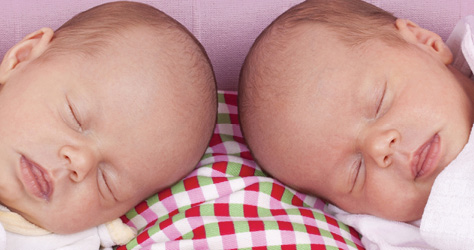That's two of everything from now on!
For most mums, twins come as a total surprise at their dating scan, although some might suspect early on if they feel they are 'big' for their dates, or if twins run in their family.
At a glance
- 1 in 65 pregnancies in the UK is a twin
- Twin pregnancies are often shorter than singletons
- You'll be offered more checks and scans throughout your pregnancy

If you do find yourself open mouthed with shock at the news, remember this - you are most definitely not on your own! Current figures show around 1 in 65 pregnancies in the UK is twin – amounting to a whopping 1 in 32 babies. Feeling better now?
How did it happen?
Well, twin pregnancies occur either when a single egg is fertilized and then divides into two, creating identical (or monozygotic) twins, or when two separate eggs are fertilised, resulting in non-identical twins. Non-identical twin pregnancies are more common than identical. If your twins are identical, they might share a placenta, depending on when the fertilised egg split.
Twin pregnancies are often shorter than singletons, with half of all twin babies being born before 37 weeks, and although most twin pregnancies are healthy, some mums could be more at risk of conditions such as gestational diabetes, anaemia, and pre-eclampsia.
Rest assured you will be offered more checks and scans with a twin pregnancy, and your babies will be closely monitored every step of the way.
Natural delivery or caesarean?
You can still plan for a natural delivery with a twin pregnancy – almost half of all twin babies are born vaginally. Your doctor may recommend a caesarean depending on your own medical history, or the position of your babies, but you can still make a birth plan, and discuss what you would like to happen during labour with your midwives.
Keep calm and breastfeed both
And don't panic about breastfeeding! Ask if the hospital has a specialist who can help to prepare for feeding more than one baby or offer advice and support after the birth. You’ll soon work out your babies’ needs and plan a routing that works for you all. Be confident – you will get there! You might choose to 'tandem feed' both babies at once, or feed one twin at a time – which ever method you go for, your midwife or health visitor will be able to help and advise.
For advice and support on having twins or more, visit the charity TAMBA.